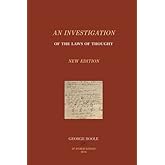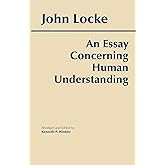
Download the free Kindle app and start reading Kindle books instantly on your smartphone, tablet, or computer - no Kindle device required.
Read instantly on your browser with Kindle for Web.
Using your mobile phone camera - scan the code below and download the Kindle app.

An Enquiry Concerning Human Understanding Hardcover – October 30, 2018
Purchase options and add-ons
- Print length192 pages
- LanguageEnglish
- PublisherSimon & Brown
- Publication dateOctober 30, 2018
- Dimensions6 x 0.56 x 9 inches
- ISBN-101731702035
- ISBN-13978-1731702036
 |
Frequently purchased items with fast delivery
 Thomistic Psychology: A Philosophic Analysis of the Nature of ManRobert Edward Brennan O.P.Paperback
Thomistic Psychology: A Philosophic Analysis of the Nature of ManRobert Edward Brennan O.P.Paperback
Product details
- Publisher : Simon & Brown
- Publication date : October 30, 2018
- Language : English
- Print length : 192 pages
- ISBN-10 : 1731702035
- ISBN-13 : 978-1731702036
- Item Weight : 1 pounds
- Dimensions : 6 x 0.56 x 9 inches
- Best Sellers Rank: #45,199 in Philosophy (Books)
- #46,376 in Classic Literature & Fiction
- Customer Reviews:
About the author

Discover more of the author’s books, see similar authors, read book recommendations and more.
Customer reviews
Customer Reviews, including Product Star Ratings help customers to learn more about the product and decide whether it is the right product for them.
To calculate the overall star rating and percentage breakdown by star, we don’t use a simple average. Instead, our system considers things like how recent a review is and if the reviewer bought the item on Amazon. It also analyzed reviews to verify trustworthiness.
Learn more how customers reviews work on AmazonTop reviews from the United States
There was a problem filtering reviews. Please reload the page.
- Reviewed in the United States on December 8, 2015Format: KindleVerified PurchaseNOT A STORY. IT IS HIS HISTORIC PHILOSOPHY. I DISAGREE WITH HIS CONCLUSIONS BUT A REASONABLE PRICE FOR THE BOOK
- Reviewed in the United States on September 3, 2009Format: PaperbackVerified PurchaseThis is a great book. It is very concise and to the point. It is not light reading though. It is packed full of content and deep thinking.
- Reviewed in the United States on October 20, 2019Format: KindleVerified PurchaseBeen meaning to read Hume for a while. Fairly hard to keep up with but enjoys m. F d n
- Reviewed in the United States on September 15, 2006Format: PaperbackDavid Hume was perhaps the leading light in the Empiricist movement in philosophy. Empiricism is seen in distinction from Rationalism, in that it doubts the viability of universal principles (rational or otherwise), and uses sense data as the basis of all knowledge - experience is the source of knowledge. Hume was a skeptic as well as empiricist, and had radical (for the time) atheist ideas that often got in the way of his professional advancement, but given his reliance on experience (and the kinds of experiences he had), his problem with much that was considered conventional was understandable.
Hume's major work, 'A Treatise of Human Nature', was not well received intially - according to Hume, 'it fell dead-born from the press'. Hume reworked the first part of this work in a more popular way for this text, which has become a standard, and perhaps the best introduction to Empiricism.
In a nutshell, the idea of empiricism is that experience teaches, and rules and understanding are derived from this. However, for Hume this wasn't sufficient. Just because billiard balls when striking always behave in a certain manner, or just because the sun always rose in the morning, there was no direct causal connection that could be automatically affirmed - we assume a necessary connection, but how can this be proved?
Hume's ideas impact not only metaphysics, but also epistemology and psychology. Hume develops empiricism to a point that empiricism is practically unsupportable (and it is in this regard that Kant sees this text as a very important piece, and works toward his synthesis of Empiricism and Rationalism). For Hume, empirical thought requires skepticism, but leaves it unresolved as far as what one then needs to accept with regard to reason and understanding. According to scholar Eric Steinberg, 'A view that pervades nearly all of Hume's philosophical writings is that both ancient and modern philosophers have been guilty of optimistic and exaggerated claims for the power of human reason.'
Some have seen Hume as presenting a fundamental mistrust of daily belief while recognising that we cannot escape from some sort of framework; others have seen Hume as working toward a more naturalist paradigm of human understanding. In fact, Hume is open to a number of different interpretations, and these different interpretations have been taken up by subsequent philosophers to develop areas of synthetic philosophical ideas, as well as further developments more directly out of Empiricism (such as Phenomenology).
This is in fact a rather short book, a mere 100 pages or so in many editions. As a primer for understanding Hume, the British Empiricists (who include Hobbes, Locke, and Berkeley), as well as the major philosphical concerns of the eighteenth century, this is a great text with which to start.
- Reviewed in the United States on November 14, 2007Format: PaperbackHume is over-rated. He skirts between the obvious and the incorrect. He asserts that geometry and math are unreal or analytical, to use a technical term, as opposed to real or synthetic. He is right about Euclidian geometry, but not math. Math is not analytical but synthetic.
While the proposition (a = b therefore b = a) is analytical, as it is a definition, from which (c = b therefore c = a) may be derived.
The initial proposition is a definition, not any type of observation. The conclusion is a derivation from the definition, not an observation.
But, (1 + 1 = 2) is an observation, synthetic knowledge. The ability to count is derived from the initial thing counted; it is not a mere definition. Were Hume correct, an analytical proposition could be used to establish a synthetic reality, which is impossible.
v = f(x) where v is variation and f means a function and x is a value.
It is a concept, analytical, saying nothing about reality. If you add reality: v being variation in gender of an human individual and w being weight. Gender does not alter because weight changes. But if you say v is weight and x is age, there will be a change in weight with age.
If the analytical could prove the synthetic, existance would become a true predicate.
- Reviewed in the United States on September 6, 2007Format: PaperbackI am surprised that Desmond David Hume had time to write such an amazing book while he was a monk, a military grunt, a sailing enthusiast and of course a member of the Dharma Initiative. Perhaps his catchphrase "See you in another life, brutha" is his hint that he has multiple lives like a cat, thus giving him time to write such an amazing piece of work.
- Reviewed in the United States on January 26, 2008Format: PaperbackHume contradicts himself all over the place. If our knowledge is so impoverished, how does he establish unalterable natural laws in order to dispense with miracles? Humanist magazines regard Hume as a model humanist. Yet, how many of these humanists, including Hume, ever did anything for their fellow man? I know plenty of Christians, such as Mother Theresa and so forth, who have spent their lives feeding, clothing and sheltering the poor; but, I cannot recall one humanist who has ever done anything unselfish and philanthropic. "Humanism" is perhaps the greatest misnomer of all time. And Hume's thesis is nothing more than another freemasonic attack upon Christianity because they hate the Truth of Christianity, which is Jesus Christ and His message.
Top reviews from other countries
 Ryan GittinsReviewed in the United Kingdom on April 30, 2019
Ryan GittinsReviewed in the United Kingdom on April 30, 20195.0 out of 5 stars University Student Approved
Used this for my uni degree and I’ve found it very useful, easy to annotate and use generally.
 M. E. DrummondReviewed in Canada on January 6, 2024
M. E. DrummondReviewed in Canada on January 6, 20241.0 out of 5 stars Cheaply reproduced copy by Amazon.ca
This edition of Hume's "An Enquiry..." is a cheaply produced "Manufactured by Amazon.ca [in] Bolton, [Ontario]" edition. It is so cheaply produced that when you attempt to send it back Amazon refunds your money and tells you to not bother returning it. Do yourself a favour and buy a to buy a copy from a more reputable source like the Oxford World's Classics edition.
 Caroline DouglasReviewed in the United Kingdom on April 17, 2019
Caroline DouglasReviewed in the United Kingdom on April 17, 20195.0 out of 5 stars Very good
Met my expectations
 AllyReviewed in the United Kingdom on February 3, 2018
AllyReviewed in the United Kingdom on February 3, 20185.0 out of 5 stars Thanks
Perfect copy for my lectures













